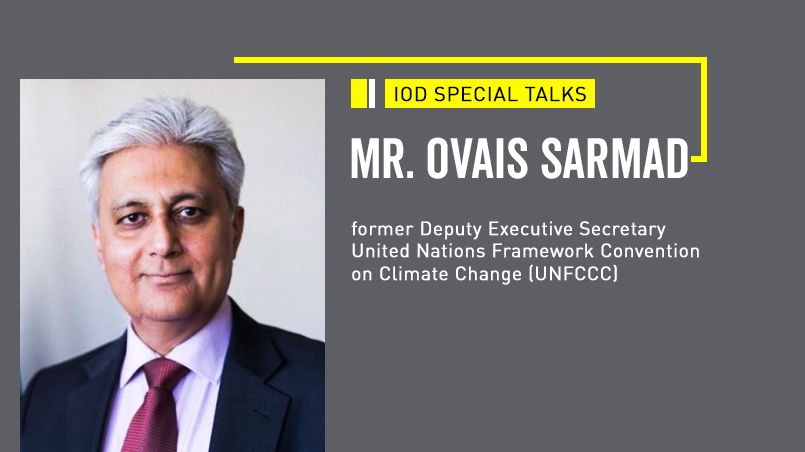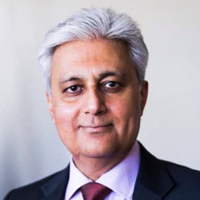 Connect with us
Connect with us

 Aug 05, 2024
Aug 05, 2024
A Global Perspective on Challenges, Innovations, and the Way Forward for Businesses
Where are we today with regard to global warming and its impacts?
I need not elaborate but simply to mention some of the impacts that have hit the headlines recently: Unprecedented heat waves in various parts of India broke all previous records. Many of you are coming from Delhi and know how it feels. Several cities in the global north and south experienced temperatures in the summers hitting 50 degrees Celsius, making daytime exposure deadly. In those cities, the low temperature during the night was 34 degrees Celsius. According to scientific evidence, this is not for human habitation as we know it. I can go on about this and share more examples, but I am sure you know it, and as I have. We all are experiencing the impacts of global warming.
What is happening in the global discourse, intergovernmental space, and politics as it relates to climate change?
The good news is that there is growing awareness, and there is no country or business in the world that is not aware of the impacts of climate change. There is more news coverage about the impacts of climate change that is leading to the general public becoming sensitive to and taking actions individually and locally. There are many examples of this. With the age-old concept that “necessity is the mother of invention," there are many breakthrough inventions around the world to tackle global warming in both mitigation and adaptation efforts. Those innovations cut across various sectors and include things such as carbon capture, the use of green hydrogen, the agriculture innovation mission (AIM), climate education through easy-to-use apps, and the list goes on. A growing number of countries are passing legislation to tackle climate change by both reducing emissions and adapting to the impacts of climate change.
But all that is not leading to a reduction in GHG emissions and global warming because of the politics such as the divide between the global south and global north over who is responsible and accountable and who should pay for the damage; the continued strong reliance on fossil fuels as a source of energy; and the inability or unwillingness of the fossil fuel industry to cut production which is a major problem.
Boards need to openly acknowledge the need for a green growth strategy and set a net zero target as the highest priority and an existential issue for the business.
Is the COP process achieving anything, and if so, what?
The intergovernmental climate change process has been in place for 30 years and has held 28 COPs so far. I was closely involved in six of those (COP23 to COP28) and have witnessed the challenges and opportunities of the process. There has been progress: global binding agreements and decisions, the most important being the Paris Agreement and unanimous decision to hold global warming to well below 2 degrees Celsius (preferably 1.5 degrees) and achieve net zero by mid-century. This is a good goal, so efforts by governments, the private sector, and even individuals can be directed towards it. It is a kind of light house. Without the intergovernmental process and efforts that have been made by governments and the private sector over the years because of those global agreements, we would be in a much worse situation-by some estimates, already exceeding 4 degrees of global warming. So, it is a question of whether the glass is half full or half empty.
But the point is that those efforts that have prevented a more catastrophic situation must be continued with greater ambition, rigour and transformative speed to avoid a scenario that no one wants. COP29: Azerbaijan expectations: finance COP, a NCQG (new collective quantified goal on climate finance). To commit to 1.5 degrees Celsius, new NDCs need to be highly ambitious, implement previous COP decisions, phase out fossil fuels, transform the food, agriculture, steel, aviation, and maritime sectors, engage civil society, and call on non-state actors to develop and commit to net-zero plans and to transform their supply chains.

Indian corporations have a critical role to play to remain on the right side of history as it relates to environmental protection and integrity.
What can businesses do: the role of the boards, the actions of the CEO, the business models that not only deliver green growth but do it in such a way that their value chains up and down their supply chains are in line with a green growth and net zero strategy?
Boards need to openly acknowledge the need for a green growth strategy and set a net zero target as the highest priority and even an existential issue for the business. The climate risk is now far too big, too immediate-rather than a distant threat-and can disrupt the business, impact its operations, and even pose challenges for its long-term existence, impacting the bottom line and share value.
As many corporations are doing, appoint CSOs (Chief Sustainability Officers) and give them the required means and resources to adapt, innovate, closely monitor, comply with, and report on the green growth strategy implementation. Such actions and reporting will have a direct impact on the credibility and integrity of the company, its share value, and the success of their services and products. I invite you to look at the Green House Gas Protocol, which is used by hundreds of global corporations. A robust and transparent accountability and reporting mechanism must be put in place, as must a culture of green growth-decoupling harmful growth for the sake of profit and sustainable development where all stakeholders contribute and benefit from customers, suppliers, and investors to management. Having seen the impacts of climate change and global processes as well as opportunities to innovate and transform when humanity is faced with existential threats, I personally believe that Indian corporations have a critical role to play in remaining on the right side of history as it relates to environmental protection and integrity.
I thank everyone in IOD and wish all participants a successful conference.

Excerpts from the 'Keynote Address' delivered by Mr. Ovais Sarmad, former Deputy Executive Secretary, United Nations Framework Convention on Climate Change (UNFCCC) at the 'Inaugural th Session' of the 25 International Conference on Environment Management and Climate Change, held on June 27, 2024 in Hotel The Lalit Ashok, Bengaluru.
Owned by: Institute of Directors, India
Disclaimer: The opinions expressed in the articles/ stories are the personal opinions of the author. IOD/ Editor is not responsible for the accuracy, completeness, suitability, or validity of any information in those articles. The information, facts or opinions expressed in the articles/ speeches do not reflect the views of IOD/ Editor and IOD/ Editor does not assume any responsibility or liability for the same.
About Publisher

Bringing a Silent Revolution through the Boardroom
Institute of Directors (IOD) is an apex national association of Corporate Directors under the India's 'Societies Registration Act XXI of 1860'. Currently it is associated with over 30,000 senior executives from Govt, PSU and Private organizations of India and abroad.
View All BlogsMasterclass for Directors
Categories